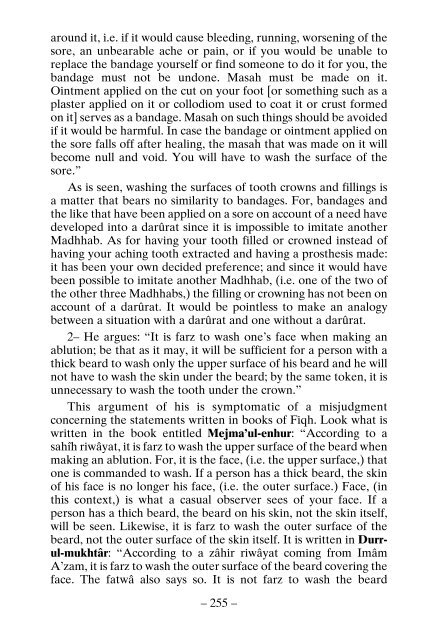O Son !
THE BOOK ‘O SON’ Al-hamdu lillâhi Rabbil ’âlamîn. Wa-s-salâtu wa-s-salâmu ’alâ Rasûlinâ Muhammadin wa Âlihi wa Sahbihi ajma’în. 1– O son! Collecting from books written by the scholars of the Hanafî Madhhab three hundred and sixty hadîth-i-sherîfs and forty-four khabars and also the seven essentials and the five rukns and the seven wâjibs and the fourteen sunnats and the twenty-five mustahabs and the fourteen mufsids of namâz, I have explained them for you. Adapt your acts and deeds to these teachings so that you attain fayz and nejât (salvation)! 2– Also for your information, I have collected a thousand and ninety âdâb (adabs) for you and for other young Muslims like you. If you adapt your actions and acts of worship to these teachings, they will be sufficient for you. If you laze, disobey Allâhu ta’âlâ and cease from these practices and manners, you will be afflicted with slavery and disgrace in the world and subjected to torment in the world to come. If you live up to them and advise your Muslim brothers to do the same, it will be useful for you. They will say blessings over you. And Haqq ta’âlâ will accept their invocations. For, a slave will be pardoned on account of another slave’s invocations for them.
THE BOOK ‘O SON’
Al-hamdu lillâhi Rabbil ’âlamîn. Wa-s-salâtu wa-s-salâmu ’alâ
Rasûlinâ Muhammadin wa Âlihi wa Sahbihi ajma’în.
1– O son! Collecting from books written by the scholars of the
Hanafî Madhhab three hundred and sixty hadîth-i-sherîfs and
forty-four khabars and also the seven essentials and the five rukns
and the seven wâjibs and the fourteen sunnats and the twenty-five
mustahabs and the fourteen mufsids of namâz, I have explained
them for you. Adapt your acts and deeds to these teachings so that
you attain fayz and nejât (salvation)!
2– Also for your information, I have collected a thousand and
ninety âdâb (adabs) for you and for other young Muslims like you.
If you adapt your actions and acts of worship to these teachings,
they will be sufficient for you. If you laze, disobey Allâhu ta’âlâ
and cease from these practices and manners, you will be afflicted
with slavery and disgrace in the world and subjected to torment in
the world to come.
If you live up to them and advise your Muslim brothers to do
the same, it will be useful for you. They will say blessings over you.
And Haqq ta’âlâ will accept their invocations. For, a slave will be
pardoned on account of another slave’s invocations for them.
Create successful ePaper yourself
Turn your PDF publications into a flip-book with our unique Google optimized e-Paper software.
around it, i.e. if it would cause bleeding, running, worsening of the<br />
sore, an unbearable ache or pain, or if you would be unable to<br />
replace the bandage yourself or find someone to do it for you, the<br />
bandage must not be undone. Masah must be made on it.<br />
Ointment applied on the cut on your foot [or something such as a<br />
plaster applied on it or collodiom used to coat it or crust formed<br />
on it] serves as a bandage. Masah on such things should be avoided<br />
if it would be harmful. In case the bandage or ointment applied on<br />
the sore falls off after healing, the masah that was made on it will<br />
become null and void. You will have to wash the surface of the<br />
sore.”<br />
As is seen, washing the surfaces of tooth crowns and fillings is<br />
a matter that bears no similarity to bandages. For, bandages and<br />
the like that have been applied on a sore on account of a need have<br />
developed into a darûrat since it is impossible to imitate another<br />
Madhhab. As for having your tooth filled or crowned instead of<br />
having your aching tooth extracted and having a prosthesis made:<br />
it has been your own decided preference; and since it would have<br />
been possible to imitate another Madhhab, (i.e. one of the two of<br />
the other three Madhhabs,) the filling or crowning has not been on<br />
account of a darûrat. It would be pointless to make an analogy<br />
between a situation with a darûrat and one without a darûrat.<br />
2– He argues: “It is farz to wash one’s face when making an<br />
ablution; be that as it may, it will be sufficient for a person with a<br />
thick beard to wash only the upper surface of his beard and he will<br />
not have to wash the skin under the beard; by the same token, it is<br />
unnecessary to wash the tooth under the crown.”<br />
This argument of his is symptomatic of a misjudgment<br />
concerning the statements written in books of Fiqh. Look what is<br />
written in the book entitled Mejma’ul-enhur: “According to a<br />
sahîh riwâyat, it is farz to wash the upper surface of the beard when<br />
making an ablution. For, it is the face, (i.e. the upper surface,) that<br />
one is commanded to wash. If a person has a thick beard, the skin<br />
of his face is no longer his face, (i.e. the outer surface.) Face, (in<br />
this context,) is what a casual observer sees of your face. If a<br />
person has a thich beard, the beard on his skin, not the skin itself,<br />
will be seen. Likewise, it is farz to wash the outer surface of the<br />
beard, not the outer surface of the skin itself. It is written in Durrul-mukhtâr:<br />
“According to a zâhir riwâyat coming from Imâm<br />
A’zam, it is farz to wash the outer surface of the beard covering the<br />
face. The fatwâ also says so. It is not farz to wash the beard<br />
– 255 –

















